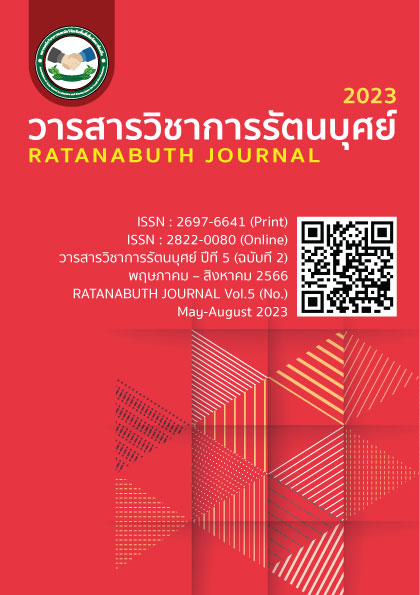Intention to stay of generation Y government officer in the Revenue Department: the mediating role of employee engagement Intention to stay of generation Y government officer in the Revenue Department: the mediating role of employee engagement
Main Article Content
Abstract
This study aims to study the factors affecting to Intention to stay and the mediating role of employee engagement on the effects of financial compensation, career growth opportunities, work life balance on intention to stay of generation Y government officer in the Revenue Department. The sample are 377 of government officer in the Revenue Department who are generation Y. The questionnaire is employed as research instrument. Data is analyzed by the structural equation model (SEM). The results showed that the level of the satisfaction in financial compensation is low level while career growth opportunities, work life balance, employee engagement and intention to stay are high level. The hypothesis tests had been found that financial compensation, career growth opportunities and work life balance have a positive influence on employee engagement, employee engagement have a positive influence on intention to stay. the mediation results show full mediation of employee engagement on the effects of financial compensation, career growth opportunities, work life balance on intention to stay.
Article Details

This work is licensed under a Creative Commons Attribution-NonCommercial-NoDerivatives 4.0 International License.
References
กรมสรรพากร. (2565). รายงานการบริหารทรัพยากรบุคคล ประจำปีงบประมาณ พ.ศ. 2564.กรมสรรพากร.
คณากร สุขคันธรักษ์. (2560). อิทธิพลของความสัมพันธ์ระหว่างพนักงานกับองค์กรที่มีต่อความตั้งใจอยู่กับองค์กรผ่านความผูกพันของพนักงาน. วิทยานิพนธ์ปริญญาบริหารธุรกิจมหาบัณฑิต,นครปฐม: มหาวิทยาลัยศิลปากร.
ฐานิตตา สิงห์ลอ. (2563). ความสมดุลในชีวิตการทำงานของพนักงานการประปาส่วนภูมิภาคเขต 3. วิทยานิพนธ์ปริญญาบริหารธุรกิจมหาบัณฑิต, นครปฐม: มหาวิทยาลัยศิลปากร.
ปฏิญญา ปิ่นทอง และจุฑามาศ ทวีไพบูลย์วงษ์. (2561). อิทธิพลของการจัดการทรัพยากรมนุษย์ที่มีต่อความตั้งใจคงอยู่ของพนักงานวิศวกรกลุ่มเจเนอเรชั่นวายในเขตนิคมอุตสาหกรรม จังหวัดระยอง. วารสารสุทธิปริทัศน์, 32(103), 174-188.
ปัทมาภรณ์ กุสุมภ์. (2560). ปัจจัยที่ส่งผลต่อการตัดสินใจลาออกของข้าราชการกรณีศึกษา สำนักงานปลัดกระทรวงสาธารณสุข.การค้นคว้าอิสระปริญญารัฐศาสตรมหาบัณฑิต, กรุงเทพฯ:มหาวิทยาลัยธรรมศาสตร์.
พิชชาภา เกาะเต้น. (2563). ผลกระทบของการทำงานเป็นทีม ภาวะผู้นำการเปลี่ยนแปลง และการรับรู้การสนับสนุนจากองค์การที่ส่งผลต่อความผูกพัน และประสิทธิภาพในการปฏิบัติงานของพนักงาน บริษัท โตโยต้านครธน จำกัด.วิทยานิพนธ์ปริญญาบริหารธุรกิจมหาบัณฑิต, นครปฐม: มหาวิทยาลัยศิลปากร.
รติรัตน์ ณ พัทลุง และณารีญา วีระกิจ. (2561). คุณค่าในการทำงาน ความสมดุลในชีวิตการทำงาน และความผูกพันทางใจของพนักงานต่อองค์กรของเจเนเรชั่นวาย : กรณีศึกษาของพนักงานโรงแรมในจังหวัดภูเก็ต. วารสารวิเทศศึกษามหาวิทยาลัยสงขลานครินทร์, 8(1), 57-80.
ระชา เมืองสุวรรณ์. (2564). ความผูกพันต่อองค์กรของบุคลากรสายสนับสนุนวิชาการ มหาวิทยาลัยบูรพา จังหวัดชลบุรี. วารสารวิทยาการจัดการมหาวิทยาลัยราชภัฎนครปฐม, 8(2), 125-137.
รุ่งอรุณ กระแสสินธุ์. (2564). ความตั้งใจคงอยู่ในองค์กรของพนักงานกลุ่ม Generation Y ในช่วงสถานการณ์การแพร่ระบาดของโคโรนาไวรัส 2019. วารสารเกษมบัณฑิต, 22(2), 27-42.
วารุณพร เชื้อวณิชย์ และธรรมวิมล สุขเสริม. (2563). ปัจจัยที่ส่งผลต่อความผูกพันของพนักงานในองค์กร: กรณีศึกษากลุ่มบริษัทผลิตน้ำแข็งแห่งหนึ่งในจังหวัดอุบลราชธานี. วารสารวิจัยวิทยาการจัดการ มหาวิทยาลัยราชภัฏสุรินทร์, 4(2), 81-95.
วารุณพร เชื้อวณิชย์ และธรรมวิมล สุขเสริม. (2563). ปัจจัยที่ส่งผลต่อความผูกพันของพนักงานในองค์กร: กรณีศึกษากลุ่มบริษัทผลิตน้ำแข็งแห่งหนึ่งในจังหวัดอุบลราชธานี. วารสารวิจัยวิทยาการจัดการ มหาวิทยาลัยราชภัฏสุรินทร์, 4(2), 81-95.
วิฑูรย์ โชตนะพันธ์. (2563). ความสัมพันธ์ระหว่างความผูกพันของพนักงาน พฤติกรรมการเป็นสมาชิกที่ดีขององค์กร และผลการปฏิบัติงานส่วนบุคคล: กรณีศึกษาการประปานครหลวง. การค้นคว้าอิสระปริญญาบริหารธุรกิจมหาบัณฑิต (การจัดการธุรกิจสากล). กรุงเทพฯ:มหาวิทยาลัยธรรมศาสตร์.
วิลาวัณย์ เพ็งพานิชย์ มาลีวัล เลิศสาครศิริ และสมพร ชินโนรส. (2562). ความสัมพันธ์ระหว่างความพึงพอใจในงาน ความผูกพันต่อองค์กรกับการคงอยู่ในองค์กรของพยาบาลวิชาชีพสำเร็จใหม่ ในโรงพยาบาลเอกชนที่ไม่แสวงหากำไร กรุงเทพมหานคร. วารสารพยาบาล, 68(3), 30-38.
ศูนย์วิจัยเพื่อการพัฒนาสังคมและธุรกิจ (SAB). (2562). ทัศนคติและปัจจัยด้านเศรษฐกิจและสังคมที่มีผลต่อการมีบุตรในกลุ่มประชากรเจเนอเรชั่นวาย. กรุงเทพฯ: ศูนย์วิจัยเพื่อการพัฒนาสังคมและธุรกิจ.
อาภานรี สื่อสุวรรณ. (2555). อิทธิพลในการทำงานของปัจจัยของค่าตอบแทนและการรับรู้ความยุติธรรมในองค์การที่ส่งผลต่อความผูกพันของบุคลากร กรณีศึกษา บุคลากรทางพยาบาล โรงพยาบาลราชบุรี. ปริญญาวิทยาศาสตรมหาบัณฑิต, กรุงเทพฯ: มหาวิทยาลัยศรีปทุม.
Baron, R., & Kenny, D. (1986). The moderator-mediator variable distinction in social psychological research: Conceptual, strategic, and statistical considerations. Journal of Personality and Social Psychology, 51(6), 1173-1182.
Bollen, K. A. (1989). Structural equations with latent variables (Vol. 210): John Wiley & Sons.
Cronbach, L. J. (1951). Coefficient alpha and the internal structure of tests. psychometrika, 16(3), 297-334.
Diamantopoulos, A., & Siguaw, J. A. (2000). Introducing Lisrel: A guide for the uninitiated. Introducing LISREL, 1-192.
Herzberg, F., Mausner, B., & Snyderman, B. (1959). The motivation to work New York. John Witey.
Katili, P. B., Wibowo, W., & Akbar, M. (2021). The effects of leaderships styles, work-life balance, and employee engagement on employee performance. Quantitative Economics and Management Studies, 2(3), 199-205.
Kline, R. B. (2015). Principles and practice of structural equation modeling. Guilford publications.
Larasati, D. P., & Hasanati, N. (2019). The Effects of Work-Life Balance towards Employee Engagement in Millennial Generation. March 2019. Paper presented at the Proceedings of the 4th ASEAN Conference on Psychology, Counselling, and Humanities (ACPCH 2018). Atlantis Press. 390-394.
Mahfouz, S., Halim, M. S. A., Bahkia, A. S., and Alias, N. (2022). How Sustainable Human Resource Management Practices Can Increase Intention to Stay Through Organisational Justice and Employee Engagement. International Transaction Journal of Engineering, Management, & Applied Sciences & Technologies, 13(2), 1-19.
Prasanthi, P. (2020). Employees' Intention to Stay: Mediating Role of Work-Life Balance. SCMS Journal of Indian Management, 17(4), 44-50.
Schumacker, R. E., & Lomax, R. G. (2010). A beginner's guide to structural equation modeling. (3rd ed ed.): Routledge Taylor & Francis Group.
Siswanto, S., & Lestari, A. E. (2019). The Determinant of Employee Engagement. IQTISHADIA Journal Ekonomi & Perbankan Syariah, 6(2), 119-130.
Weng, Q., & McElroy, J. C. (2012). Organizational career growth, affective occupational commitment and turnover intentions. Journal of vocational behavior, 80(2), 256-265.
Yuan, K. H., Wu, R., & Bentler, P. M. (2011). Ridge structural equation modelling with correlation matrices for ordinal and continuous data. British Journal of Mathematical and Statistical Psychology, 64(1), 107-133.
Zhang, H. (2019). Predictors of Intention to Stay Among Employees management in The Selangor Manufacturing Organizations. International Journal of Science, 6(11), 53-63.


